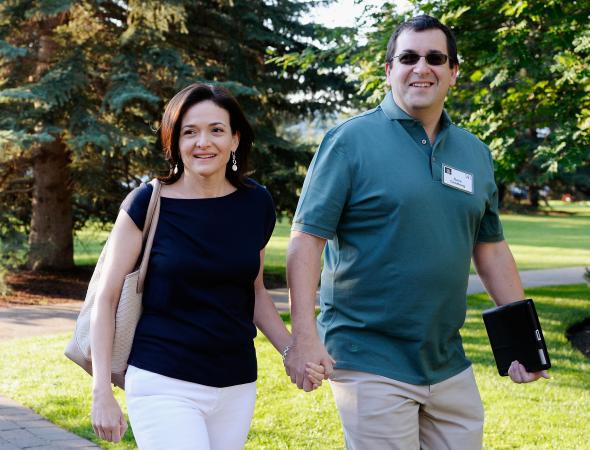David Goldberg was the CEO of SurveyMonkey. But after he died unexpectedly Friday night while exercising on vacation in Mexico, most headlines referred to him in terms of his wife, Facebook Chief Operating Officer Sheryl Sandberg, and her famous women-in-the-workplace philosophy. One Associated Press headline read, “David Goldberg, Tech Exec Married to ‘Lean In’ Author, Dies.” The cascade of tributes to Goldberg discussed his considerable professional achievements, but they took a backseat to praise about his dedication to his wife, to his two young children, and to supporting women. In the New York Times, Jodi Kantor wrote that people saw Goldberg as “the living, breathing, car-pooling center of a new philosophy of two-career marriage”—one in which women keep their professional ambitions intact even when starting a family.
So far, one remarkable thing has been missing from the conversation. Sandberg’s Lean In approach to a work-family balance has its flaws, contradictions, and omissions—among other things, it is applicable only to the relatively privileged, those who can afford child care and have an accommodating co-parent. But staying connected to the workforce even when you have young children isn’t just about professional fulfillment. It’s about staying prepared for a worst-case scenario. And the death of a beloved fortysomething husband, while you have young children, is a worst-case scenario.
After I was born, my mother, Regina Bosch—a very smart woman who has an MBA from Wharton—abandoned her consulting career to focus on her children. It seemed like a noble sacrifice: While her work meant a great deal to her, she thought that it would be better for my two brothers and me to have a stay-at-home mom. My father made a good living as an attorney, and our lives were comfortable.
But then, when I was 11, my father killed himself. My mother had been out of the workplace for more than a decade (with the exception of a part-time job she had just started, at a bank). Worse, she had just experienced the most traumatic event of her life: the suicide of her college sweetheart, whom she met at 17 and married at 21. Re-entering the workforce is difficult enough for women (and men) who take a few years off until their kids enter school or until a divorce changes circumstances. Jumping back into a career after 11 years, in the immediate aftermath of a spouse’s suicide, while trying to support three mourning children? Close to impossible.
“I had my age working against me. … I was 42, so people thought of me as perhaps older and not as vigorous,” she told me today. “And of course I had children to take care of, and I couldn’t do a lot of the schmoozing.” So she used the life insurance money to go back to school and get another master’s degree. But even with her skills and more up-to-date résumé, it was a major struggle. And the acute, complicated grief of losing my father to suicide didn’t help.
“I just didn’t have the emotional resources to dedicate myself to work 100 percent,” she said. “I was mourning Dad, but I also had to keep an eye on you guys, to make sure that you were OK.” Though she worked lots of jobs in the years that followed, her career never got back on the proverbial track; she didn’t earn the money or the personal fulfillment that she had before she leaned out. The gap in her résumé, emotional distress, health problems—many of them linked to trauma and the “mixed-up grief” suicide brings—all of it held her back.
Now, she regrets the time she took off after my brothers and I were born. “It would have been much better if I were working when he killed himself. I would have gotten another layer of support and had someplace to go that wasn’t so sad. And of course trying to prove yourself in a new job, when part of your mind is just this constant swirl of emotions, is really hard.”
Sandberg faces a terrible situation, but a situation that will not be made more terrible by worries about how to feed her children or pay the mortgage. She can focus on the most important issues—her grief and that of her children. Given Goldberg’s own successes, Sandberg would probably have been financially stable in widowhood even if she hadn’t leaned in. But in some ways, her message is even more powerful now: It looked like she had the perfect life, but no one is immune to shocking upheavals. Whatever her philosophy’s shortcomings, leaning in even a little bit—staying connected to the professional world while focusing on your children—can help keep you on your feet, if and when the universe lands a sucker punch.
